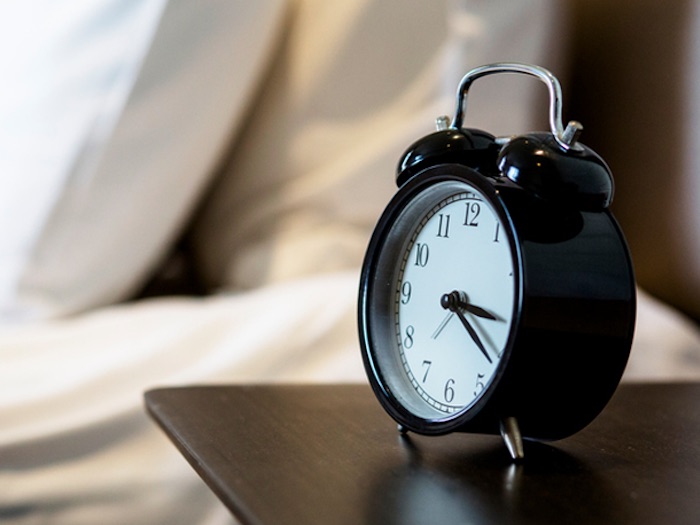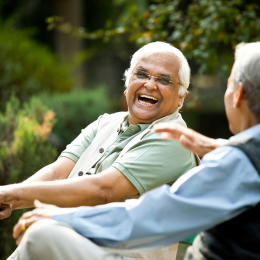5 Sneaky Reasons You Can’t Sleep
Identifying why you’re having trouble sleeping is the first step toward a good night’s rest.

Smartphones, caffeine, jet lag. Sometimes it’s easy to figure out why you’re staring at the ceiling at 2 a.m.
But what if you’ve banned devices from the bedroom, sworn off caffeine after noon, and keep to a regular sleep schedule? Other factors may be keeping your eyes wide open. A common one: age. Certain sleep disruptors tend to hit later in life.
Here are five reasons you might be having trouble sleeping—and what to do about each.
Sleep Problem #1: You’re a Late-Life Insomniac
Slept like a baby your whole life but suddenly struggling to doze off post-retirement? You’re hardly alone. “Insomnia is the most common sleep problem in adults ages 60 and older,” says Damon Raskin, M.D., a sleep expert in California.
The condition is thought to impact older adults more because of the sleep-disrupting physical and mental concerns—say, gastrointestinal issues or depression—associated with aging. If you have it, you’ll not only have trouble falling asleep, but you struggle to stay asleep, says Dr. Raskin.
See your doctor if you’re worried. “Treatment of late-life insomnia can involve psychological strategies, prescription medicines, or both,” he says.
Add SilverSneakers to your wellness routine. Classes and events are happening right now at participating gyms, online through SilverSneakers LIVE, and at community centers near you. Activate your free online account to get started.
Sleep Problem #2: You Have Undiagnosed Sleep Apnea
Sleep apnea—when you experience short pauses in breathing while you slumber—is a common sleep disorder, particularly as we grow older.
And it’s dangerous. “If untreated, sleep apnea can lead to high blood pressure, stroke, or memory loss,” Dr. Raskin says. It’s more difficult to diagnose older patients, he adds, because sometimes it comes with no symptoms. Look out for these sleep apnea signs: snoring, waking up with a headache, or feeling sleepy throughout the day—even after a full night’s sleep.
Women in particular should pay attention. “More women develop sleep apnea later in life,” says Michael Breus, Ph.D., a clinical psychologist and fellow of the American Academy of Sleep Medicine. “Prior to menopause, we see a two-to-one ratio of men to women. After, it goes one to one.”
Treatments vary. Losing weight or changing sleeping position can work for some. Others have to wear a continuous positive airway pressure (CPAP) mask, which forces air into the lungs to keep your breathing normal. If you have any symptoms of sleep apnea, see your doctor.
Sleep Problem #3: You Keep Having to Go to the Bathroom
If your bladder is the culprit, you’re not alone. Almost 60 percent of adults 65 and older report waking up for a bathroom trip at least twice during the night—and a third wake up at least three times to urinate, according to a study in the Journal of the American Geriatrics Society.
Annoying? For sure. Luckily, simple lifestyle changes, like adjusting the timing of your evening meal, can help in some cases. But in others, excessive nighttime urination (a.k.a nocturia) could be a sign of a deeper health issue that needs to be addressed with the help of your doctor.
Learn more with these reasons you keep waking up at night to pee.
Sleep Problem #4: Your Meds Are Messing with You
Doctors don’t always explain all the ways a drug might impact your life, besides treating the condition it’s prescribed for. As it turns out, many common drugs—respiratory meds, decongestants, beta-blockers, and some antidepressants—can disrupt sleep, Breus says.
Subscribe to our newsletter
It's quick and easy. You could be one of the 13 million people who are eligible.
Already a member? Click to discover our 15,000+ participating locations.
Follow Us
Before starting a new prescription or over-the-counter med, ask your physician or pharmacist about any sleep-disrupting side effects. If you are currently on a prescription medication and have trouble sleeping, continue taking the medicine as directed, but let your doctor know about the side effects.
Sleep Problem #5: Your Sleep Architecture Is Changing
Sleeping half the day as an infant or not being able to wake up for class in high school is normal. Our sleep needs evolve as we get older.
“As people age, their ‘sleep architecture’ changes,” Dr. Raskin says. “They tend to go to sleep earlier and wake up earlier.” These changes mean a decrease in deep, restorative sleep and an increase in light, transitory sleep, he says. In other words, you’ll wake up more easily throughout the night.
Aim for seven to eight hours of sleep per night. In its first-ever age-specific guidelines, that’s the amount the National Sleep Foundation recommends for adults ages 65 and older.
Activate Your FREE SilverSneakers Online Account
Get hundreds of free SilverSneakers On-Demand videos and stay in touch with us by creating your free online account. You don’t have to be a SilverSneakers member to get on-demand workout videos, health and fitness tips from SilverSneakers, and more.
SilverSneakers members can go to thousands of nationwide gyms and fitness locations, plus take SilverSneakers LIVE online classes led by specially trained instructors and designed for all fitness levels and abilities – at no additional cost. If you have a Medicare Advantage plan, it may include SilverSneakers. Check your eligibility here.
Already a member? Get your SilverSneakers member ID, search for locations near you, and all the health and wellness resources you need by logging in to your online member account here.




